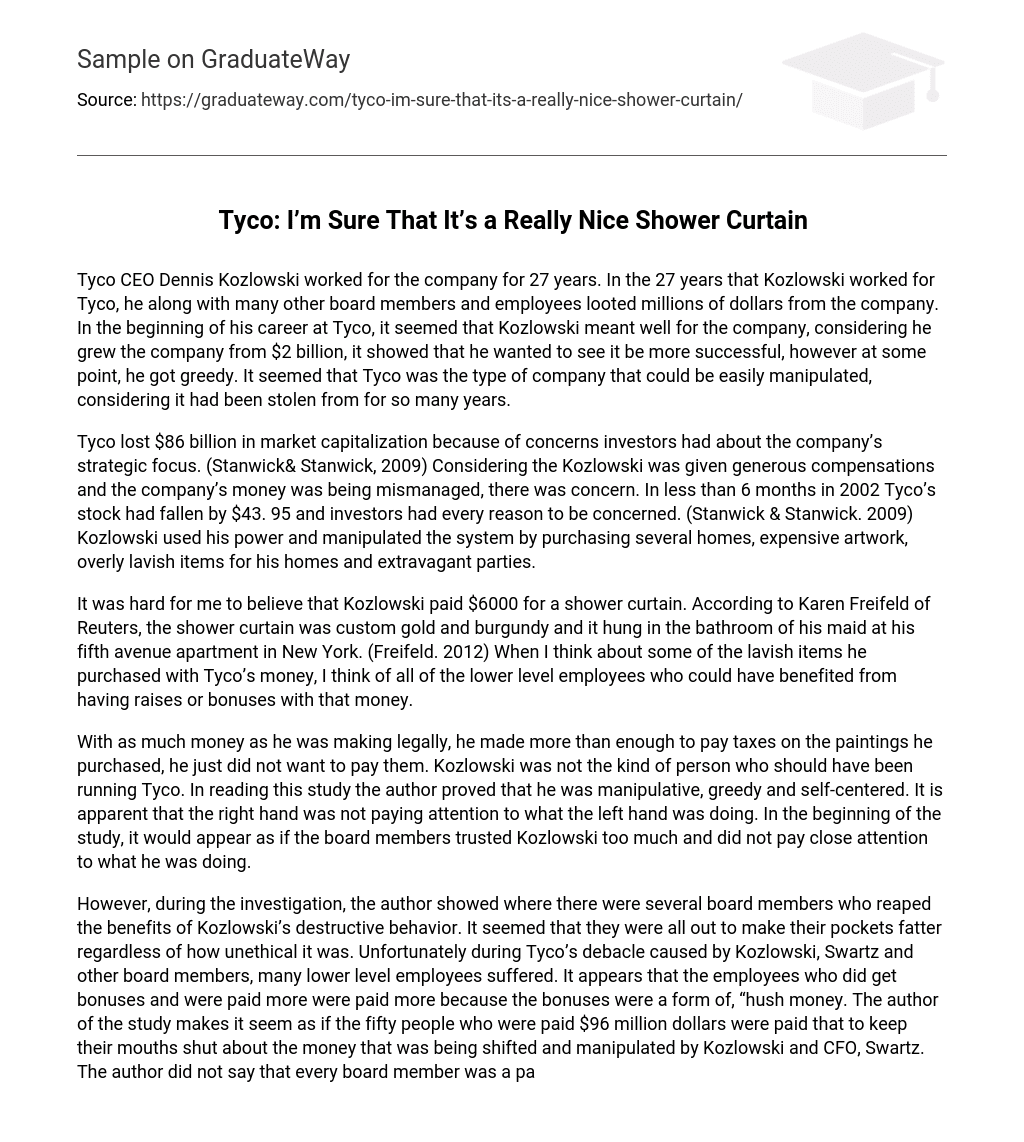Tyco CEO Dennis Kozlowski had a 27-year tenure at the company where he, along with fellow board members and employees, embezzled millions of dollars. Initially, Kozlowski appeared to have good intentions for Tyco as evidenced by his contribution to the company’s growth from $2 billion. However, greed eventually consumed him. The ease with which Tyco was exploited suggests a vulnerability resulting from years of theft.
According to Stanwick and Stanwick (2009), Tyco experienced a significant decrease in market capitalization worth $86 billion due to investor concerns about the company’s strategic focus. These concerns arose because there were worries about the generous compensations given to Kozlowski and the mismanagement of the company’s funds. Within a period of less than 6 months in 2002, Tyco’s stock plummeted by $43.95, which understandably raised concerns among investors (Stanwick & Stanwick, 2009). Kozlowski abused his power and manipulated the system by using company money to purchase multiple high-end properties, expensive artwork, luxurious items for his homes, and extravagant party expenses.
The $6000 shower curtain purchased by Kozlowski is astonishing to me. As reported by Karen Freifeld of Reuters, the curtain was a customized gold and burgundy one that adorned the bathroom of his maid at his New York apartment on fifth avenue (Freifeld. 2012). Contemplating the extravagant purchases made by Kozlowski using Tyco’s funds, I can’t help but consider all the lower level staff who could have been positively impacted through raises or bonuses using that money.
Despite earning a significant amount of money legally, he had enough to pay taxes on the paintings he bought but deliberately avoided doing so. Kozlowski was not suitable for the leadership position in Tyco as this study demonstrates his manipulative, greedy, and self-centered nature. The lack of coordination between different parts of the company is evident. At the start of the study, it seems that board members placed excessive trust in Kozlowski and failed to closely monitor his actions.
During the investigation, it was revealed that several board members benefitted from Kozlowski’s destructive actions, showing their disregard for ethics in favor of personal gain. Unfortunately, the consequences of Tyco’s downfall, caused by Kozlowski, Swartz, and other board members, were borne by lower-level employees. According to the author, employees who received bonuses and higher pay were essentially receiving “hush money” to keep quiet about the illicit money shifting and manipulation conducted by Kozlowski and CFO Swartz. While the study does not implicate every board member in the Tyco scandal, it raises questions about those not mentioned. It appears that had other board members been more diligent in examining the situation, Tyco would not have found itself in such dire straits when Kozlowski began embezzling from the company.
Additionally, I am curious about how he managed to allocate such a substantial amount of money to a relocation fund and include other expenses, like financing private schools for his family. The investigation conducted by the SEC revealed that Tyco had been plundered of billions of dollars, and there were insufficient protocols in place for authorizing employee actions. Moreover, the reports of the companies that Tyco was acquiring were manipulated.
It makes me question if Scalzo, a partner at PricewaterhouseCoopers (PWC), also received hush money from Kozlowski for overlooking the accounting practices at Tyco (Stanwick & Stanwick, 2009). He seems accountable for not thoroughly investigating and obtaining board approval for the funds. The extensive embezzlement and resulting job losses caused by Kozlowski and Swartz’s negligence indicate they should be severely punished for their misconduct. Their actions not only caused financial losses for stockholders but also endangered thousands of workers’ jobs. Tyco would not have faced such significant hardships without their excessive greed.
References
Stanwick & Stanwick, (2009. ) Understanding Business Ethics, (1st ed. ). PearsonHall Education, Inc. Karen Freifeld (June 13, 2012) Reuters. Kozlowski’s $6,000 shower curtain to find new home. Retrieved August 28, 2012 from http://www.reuters.com/article/2012/06/14/us-tyco-curtain-idUSBRE85D1M620120614I





